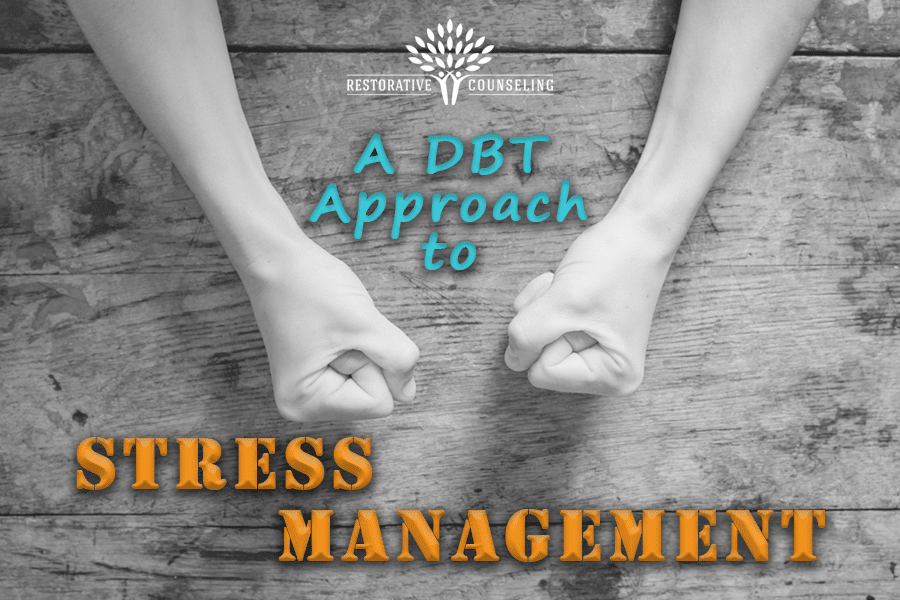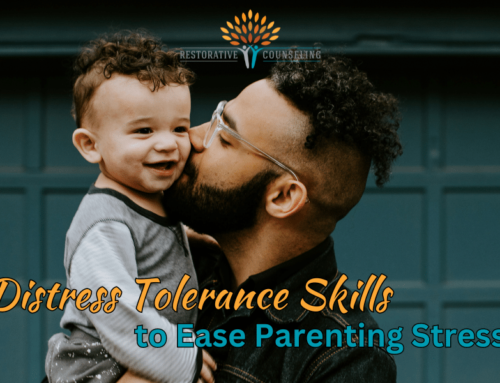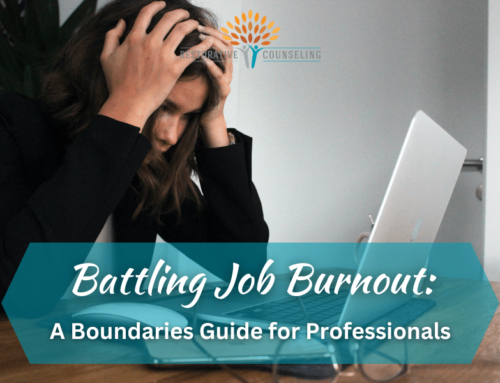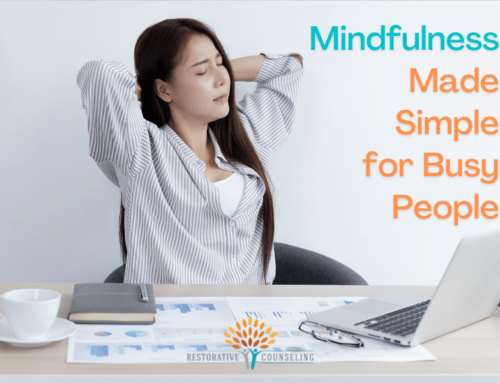Written by The Restorative Counseling Team
Every person experiences some form of stress in their life. There is no better time than now to learn how to manage it.
Managing stress does not necessarily mean that you will live a stressor-free life. Rather, developing stress management techniques provides you with effective ways of moving through times of stress. Consider Marshall as an example:
Marshall has come to realize that he doesn’t handle stress well. Lately, Marshall has had several experiences that have made him consider learning better ways to cope. Both at work and with his friends, Marshall recognizes that he has been taking his stress out on others. He has started getting into more arguments with his girlfriend, and his friends have stopped inviting him over as much. At this point, he feels out-of-control and helpless.
Marshall wants to mend these relationships. However, he is having a hard time expressing how he feels and what his needs are. He doesn’t understand why he keeps lashing out at others. He truly doesn’t know why he can’t get himself under control.
Marshall notices differences between how he is affected by stress and how he sees others coping. He cannot figure out how others seem to be less affected by their stress, while he gets so wound up. Upon reflecting, Marshall sometimes thinks that his reactions don’t match the problems he encounters, but it’s hard for him to see that until after the issue has passed.
After thinking more about his desire to manage his stress better, Marshall decides to seek out counseling. After several sessions with a therapist who uses a DBT approach, Marshall starts to see how he can manage his stress in new ways. As a result, he gets into fewer fights with his girlfriend. He can express his needs much better at home and at work. Marshall starts to feel happier!
DBT and Distress Tolerance Skills
Dialectical Behavioral Therapy is a therapeutic approach created by Marsha Linehan that teaches skills to help a person live a meaningful life. DBT is a useful method for coping with anxiety and stress, and can benefit anyone who feels sensitive to their environment, is highly reactive to events, can be easily overwhelmed by emotions, and finds it difficult to return to a calm state when distressed.
Some people grow up learning how to manage stress and anxiety effectively. Others find managing their life stressors more challenging for biological and/or environmental reasons. Based on the Biosocial Theory, some people are biologically predisposed to emotional dysregulation or grew up in environments that were invalidating in some way. As a result, a person may have learned ways of coping that helped them to some degree while growing up but are not beneficial any longer.
Whatever may be the source of your challenges with coping with stressful circumstances, you are both responsible for your actions and empowered to change how you cope. DBT assumes that people are doing the best they can AND that they can still improve. While a person may not have caused all of their problems, they are responsible for learning to cope with them effectively.
Mindfulness is key to the process of changing how you cope.
The core skill of mindfulness allows a person to be present in the moment without judgment. Mindfulness requires using one’s senses to be fully aware of their external and internal experiences. This awareness allows a person to better understand their levels of distress and start the process of determining what they need to cope and when.
Start building your distress tolerance skills by creating a Distress Scale:
- Draw a vertical line on a piece of paper, placing numbers on the line from 1-10, with 1 at the bottom of the page and 10 at the top. 1 represents the least distressed you have felt and 10 represents the most distressed you have felt.
- Think about what emotions, thoughts, physical sensations and urges you experience at each point on the scale and note them. Over time, add additional things to your scale as you notice them.
Creating a distress scale for yourself will help you understand what you need at different levels of distress. Not all coping and DBT strategies are effective at every distress level.
Distress Level 7-10
Distress Tolerance skills help you cope with experiences of high distress without making the distress worse. These skills allow you to accept your current level of distress without judgment. Coping strategies of this type can help you get through distress without falling into despair or acting on harmful urges.
Distress Level 4-6
Emotion Regulation skills assist you with changing your emotions to either match your experience or to seek out a different emotional experience. The skills help you better understand your emotions and reactions. Thus, you have a greater ability to change unwanted emotions and reduce emotional intensity.
Distress Level 1-3
Interpersonal Effectiveness skills allow you to tend to your relationships and assert your needs when necessary. Skills of this type help you ask others for what you need, and say “No” to things others ask of you.
All these skills can be hard to use at times, but being mindful of your distress level is a great way to help manage anxiety and stress.
Take Steps to Improve Your Distress Tolerance with DBT
In addition to teaching you how to use Dialectical Behavioral Therapy skills, a therapist can help you with the following:
1. Dialectical Thinking
Thinking in terms of black and white, good and bad, or right and wrong rarely gives you an accurate picture of what is going on. It is important to practice recognizing that most experiences fall somewhere in between the extremes. A therapist can support you in learning how to adjust your mindset.
2. Behavior Change
A therapist will help you to identify behaviors without judgment that are not serving you. As a result, you will be able to use your new DBT skills to minimize negative consequences to you.
3. Gain Insight
Reflecting on situations where you behaved in a distressing way will help you identify what you want to change. A therapist will help you to acknowledge where you have been skillful and where there is room for growth. They will encourage you to practice choosing behaviors that lead to positive outcomes. Then, you can use the insight when faced with similar situations in the future.
Stress makes life challenging for everyone at one time or another, and some stressors are often unavoidable. You deserve to feel more control over how you move through stressful events. DBT is one such way to approach developing your ability to manage stress better. Remember, you are capable! Schedule an appointment now to get the support of a therapist on your path to better stress management.






